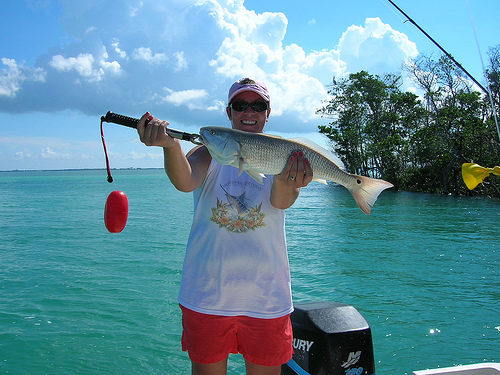
- by Melody in Orange Beach, AL
These are just some of the fish I have caught and released in Key West, FL. The redfish was fun to catch. They are a lot different in the Florida Keys than they are here on the Gulf Coast in Mobile Bay. Our guide said it was a large redfish. We were using live shrimp and cut bait, along with a chum bag off the back of the boat. The rods were light tackle.
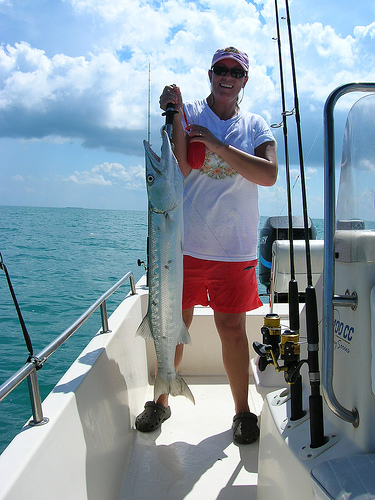
The barracuda was also fun to catch; there is some danger involved with the large teeth. We used live pinfish and had a chum bag off the back of the boat. We were again using a light tackle rod.
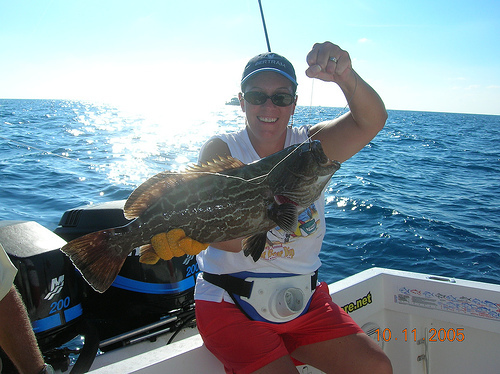
The black grouper was caught over a wreck. Although it’s not very big, it felt like I was reeling in a Volkswagen. The main trick is to keep them from swimming deeper into the structure or reef and breaking the line.

The shark was actually caught using live shrimp! It was about a 15 or 20 minute fight. She weighed in around 85 pounds. I was glad when it was over. My arms were worn out. I was using a light tackle rod.
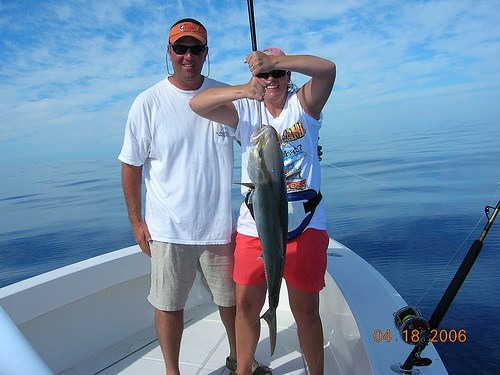
The amberjack was caught around a wreck, just before heading in. We hadn’t caught much of anything that day. I almost handed the rod to my husband, but he insisted that I keep going. The guide estimated that she weighed about 65 pounds. My arms were shaking, and they were very “jell-o” like afterward. I was so glad that I kept the rod!
I enjoy saltwater fishing immensely, and releasing a fish is a nice feeling –I could catch it again some day!
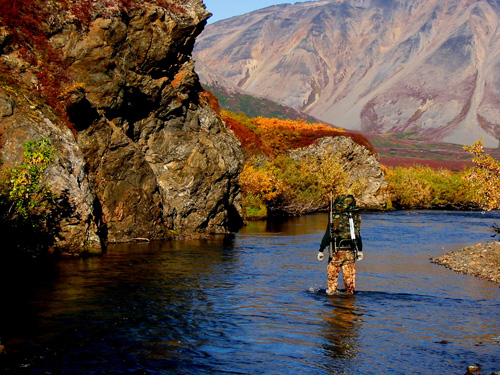
- by Jim Overman
I have wanted to go hunting and fishing in Alaska for as long as I can remember, but like it is for most people, it was just a dream. That all started to change in the fall of 2001 while I was on my annual “Big Trip,” which consists of going from Bainbridge, GA, to my hometown in Tennessee to deer hunt with my bow without being harassed by gnats. I typically meet two friends from college (plus a tag along partner or two that changes from year to year) and we spend the next week or so chasing every deer in West Tennessee. Do not get me wrong I enjoy the annual pilgrimage and have harvested some very nice trophies and had some very exciting hunts.
As it usually does, the topic of changing the hunt location to Texas, Kansas, or Illinois came up at dinner the last night of our trip. Eventually the conversation turned to either the typical dream trip of elk hunting out west or the ultimate adventure of going to Canada, Alaska, or Africa. Then something odd happened: one of my friends said he was serious about wanting to go on the “Trip of a Lifetime” sometime in the next couple of years. We talked about the types of trips and what we liked or disliked about each destination plus the stories we’d heard from other hunters, especially concerning elk hunts. My friend Bubba (and yes that is his name) asked me to “check into it” and let him know some details so he could start planning. I thought he was joking and said, “Sure, where do you want to go and what do you want to hunt.” He laughed and said a real adventure was what he was looking for and the more remote the better.
About two weeks later while I was still recovering from the Tennessee trip, Bubba called and asked what the plan was for the “Trip of a Lifetime.” I told him that I had thought he was joking, and said that I could not afford a trip, and I made up about five or six “reasons” I could not go. Then he asked if the time was ever going to be “right.” I thought about it for a few seconds and realized that if I was ever going to take such a trip, I needed to make that decision now. Besides, I wanted to go with my best friend so that if my wife kicked me out of the house, I could blame it on him and have a place to stay at his house.
Discussions about the trip became a weekly ritual until the week before Christmas 2001. We both read books and magazine articles, talked to every one we knew that had taken a trip out west or to Alaska, and watched countless videos. We laid out a few stipulations: First, we would keep the trip under $5,000 including transportation, food, lodging, licenses, trophy fees, and any other trip related cost. Second, we wanted to have the opportunity to hunt with a bow or a rifle. Third, we would choose our hunting partners and not have them chosen for us. Fourth, we should have a reasonable chance for success on wild game and not animals on a fenced ranch. Fifth, we would try an unguided trip so the hunt would be more challenging and less expensive. Sixth, we would make the decision as to the type of game, area, and time-line by the end of January, 2002.
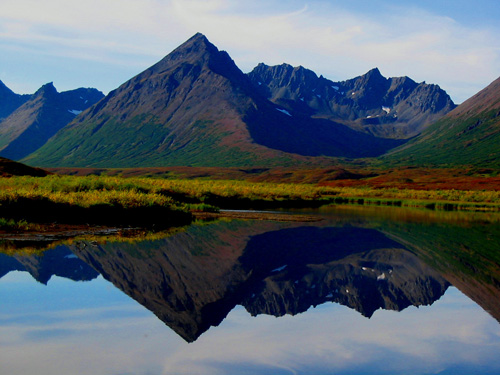
By January, the most difficult part was over; we made the decision and set the time-line. We decided to go to Alaska during September, 2003, for an unguided combination caribou, moose, and black bear hunt with Alaskan fishing thrown in for icing on the cake. The trip plan was to take a commercial flight to Anchorage and then a smaller plane to a village on the south-central coast and then take a float plane to an area where the mountains meet the tundra. We would then set up a tent camp to hunt and fish for ten days in the heart of grizzly country. We determined that to meet our financial goal we needed to split the transportation and camp setup cost among five hunters. We began the task of finding three other people we trusted and more importantly who would bring skills needed to survive in the wilderness for ten to twelve days.
Typically the first response to the invitation was excitement quickly followed by, “Ya’ll are crazy.” Then the question was always ,“How many times have you done this trip?” We responded never and that only one guy had ever been to Alaska. Then we would explain that his trip was a guided hunt from a cabin while he was in high school. The reaction was an emphatic, “Ya’ll are crazy, but good luck.”
The “trip team” was finalized by the spring of 2002. To truly understand this trip, you need to know the backgrounds of the guys. Needless to say all of us are avid outdoorsmen that have spent most of our lives hunting and fishing. But each team member brought some type of expertise to the table. Because I travel the most often and I am the most computer savvy (which is not saying much with this group) I was responsible for all transportation and logistics. This included arranging air taxis, commercial air travel, and hotels, and developing spreadsheets to determine the allowed weight limits for each person and every piece of equipment. I also put together the camp food list and was the primary cook while in camp. The guys know by looking at me that I do not plan on going hungry. My only other responsibility was to be the fishing guide.
Bubba is as athletic as they come. He is an Ironman triathlete and has competed in the Ironman USA in Lake Placid, New York. He has a degree in Wildlife Biology and has worked as a wildlife officer for the past eleven years. He was responsible for the overall organization and coordination of the group as well as interpretation of the wildlife regulations. This was a major task due to the complications of an unguided hunt that might change at the last minute depending on where we setup camp. He has a passion for outdoor photography and the camera equipment to take some amazing photos, thus he was the official cameraman. Due to his athletic training, Bubba was also expected to literally carry the heavy loads while on the hiking trips.
Bentley is my college fraternity big brother. He lives in the mountains of western North Carolina, so the elevation and terrain of Alaska would not be a physical challenge for him. He is a camping, hiking, and outdoor survival expert in every sense of the word. In addition, he is the best archery instructor and bow hunting field setup person I have ever met. Bentley has taken literally hundreds of camping trips over the last few years, and in a real test of survival he and his wife took a two-week canoe trip through the Boundary Waters on the Canadian border during the summer of 2002. Along with archery equipment, he was in charge of the camp setup. This included everything from purchasing the tents, camp tools, water treatment equipment, cooking equipment, bedding, table, chairs, camp shower (with hot water), lighting, and campsite selection once we arrived.
Paul is the eldest of the group and the most practical. He is retired from the Army and spent the last few years of his career in the Special Forces until an injury forced his retirement. After his military career was over he became a very successful businessman. Paul’s only three stipulations for the trip were: 1.) Plenty toilet paper, 2.) Plenty of hot water for showers, and, 3.) Some type of communication to the outside world. He provided the group with a solar powered satellite phone to make those important calls (to tell the women were are alive.) Because he was in the Special Forces, he has extensive training in survival. Paul worked as a paramedic at one time and had experience with advanced field care while in the military. Therefore, he was responsible for the first aid and medical care in case of an accident. He is also a weapons guru and he determined the exact type of rifles, handguns, optics, and communication equipment we needed for the trip. The final item that fell to him was the task of shipping all non-perishable food and equipment to Alaska and back by a combination of air freight and cargo ship.
The fifth member was Bill. He is a mechanical engineer and a manager at a medical device manufacturing plant near Memphis, TN. He is one of Paul’s best friends and a valuable team member due to his practical approach to every situation. Bill was responsible for all aspects of harvested game care. This included the methods to field butcher and pack back to camp each potential species, care and storage of the meat, protection of the meat stash from bears and insects, preparation of any potential trophies, care of the pelts, shipping methods to return the meat and racks to the lower 48, and donation of any of the meat the hunters did not want to ship home. This might seem like an easy assignment, but it took an incredible amount of time and planning to be ready for 1,500-pound moose, 500-pound caribou, 8-foot tall black bears, and potentially a wolf pelt with limited tools in what could be bad weather. Alaskan laws are very strict in terms of edible meat recovery and movement of game once it is harvested. Fines can be issued for up to $10,000 per offense and a mandatory seven to ten days in jail for abandonment of downed game or improper recovery.
The actual trip had had only one adjustment from the original five members, and that was to include a sixth man who took on the role of camp helper. This was Jeremy, a 22 year old active duty Marine from Bainbridge, GA. We had decided that including a younger able-bodied assistant to help with some potential heavy loads would make the trip safer and more enjoyable.
Now the team was set and the plans made for the “Trip of a Lifetime.”
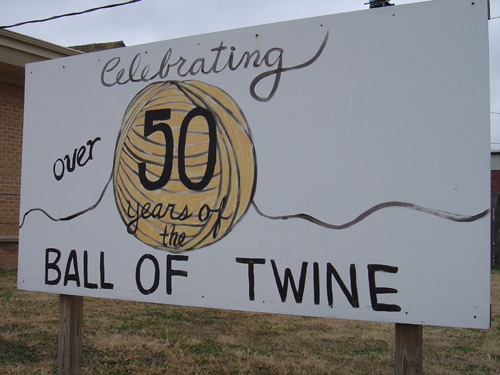
Sunday, October 29, 2006
I’m sitting at home in front of a Saints game. I’m not really watching the game because I’m preparing to go hunting, and in my mind I’m already on the trip. That’s the best part of any vacation, really. You get to leave long before you even get off work. There are only four days to go or, counting this one, four and a half. I know I won’t get to watch much TV while I’m gone, so I am clearing the Tivo, gorging myself on brain candy and the fattening kind too. The sugar rush is a welcome change. I’ve lost twenty pounds over the past two months. This is partly a result of exercise and diet and partly damage control. I was recently diagnosed with a hiatal hernia which means small meals, nothing fried, and no alcohol. These are basically things I needed to do anyway, but the searing pain that results from a violation of any of these guidelines is very motivational. It’s comparable to the sensation of having eaten a box of ten-penny nails, hot-dip galvanized.
This trip physically hammered me last year. The other guys are in much better physical condition that I am. Raimey is a surveyor, so he basically walks for a living. The other two, Kirk and R.J., install and service heating and air conditioning systems, crawling around in basements and attics in the Alabama heat. And then there’s me, the desk jockey. I type, I talk on the phone, and when I really feel like stretching my legs, I walk fifteen feet to the copier or, if I’m feeling adventurous, the water cooler. I’m a modern day Walter Mitty, a legend in my own mind. I’ve had African adventures with Hemingway, Ruark, and Capstick, but our safaris are all within the pages of a book.








